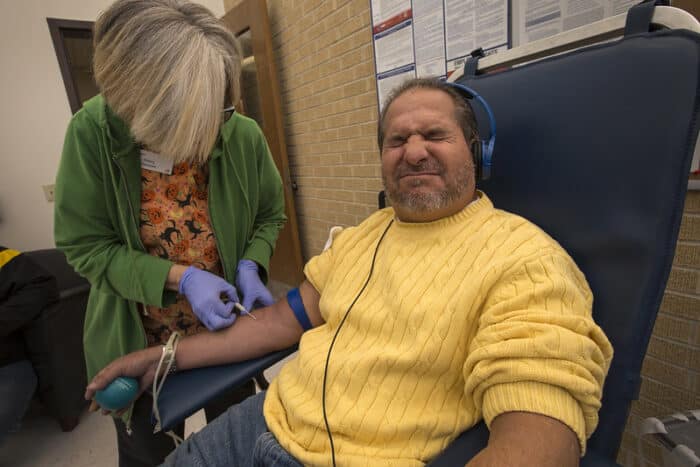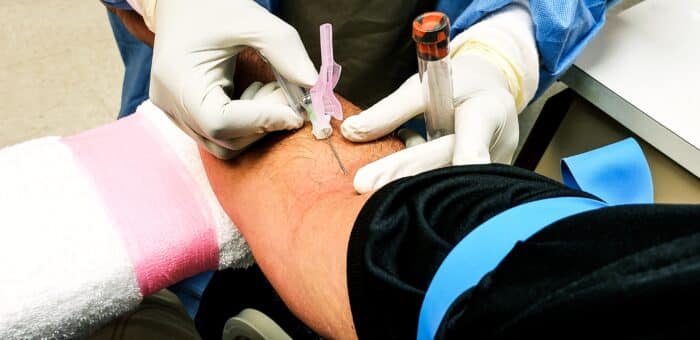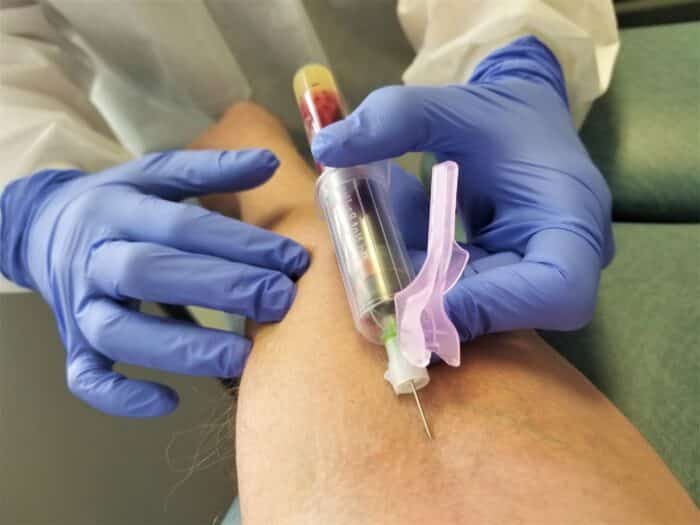If you’re an aspiring phlebotomist or just someone who is interested in pursuing this rewarding career,
You might be curious about the career path attached to it and how you can become a successful phlebotomist.
Don’t worry, we’ve got you covered with just that today.
In this article, we will uncover the phlebotomy career path, career options, and career objectives for a phlebotomist.
So get your reading glasses on and let’s get started!
Phlebotomy Career Path
The career path or process of becoming a phlebotomist might sound intimidating to read at first, however, we’re here to tell you that it’s not as difficult as it sounds.
Here is a step-by-step guide on how to become a successful phlebotomist:
High School Diploma
The first and mostly the only requirement needed to start your journey as a phlebotomist is to complete your high school diploma or a GED.
Online Phlebotomy Training
The next step is to choose a relevant phlebotomy course. There are two main ways you can get your phlebotomy training, via online classes or in-person via diploma or certificate courses.
Choosing an online phlebotomy class is always recommended since it offers numerous perks.
Let us take a look at some of them-
- Online classes are flexible, you’ll be learning anytime and from anywhere, even from the comfort of your own room.
- Online classes are also self-paced, which means you can schedule it according to your own pace and time schedule.
- They are much cheaper than their alternatives, so you won’t have to be stressed about undertaking any financial aid or student debt.
- Most online classes also offer externship opportunities, which are crucial before you step into a real-world setting as a phlebotomist.
See: How to Become a Phlebotomist
Getting Clinical Experience
One of the most important aspects of becoming a phlebotomist is to gain clinical experience, for several reasons, such as developing venipuncture skills, practicing your skills in a real-world setting, and more.
Getting Certified
Even though getting certified as a phlebotomist is not necessary, it is highly preferred by employers.
This is because getting certified shows that you are capable of handling the day-to-day sensitive tasks that require optimum care such as venipuncture.
Phlebotomist Career Options
After you get your phlebotomy certification, you have many career options to choose from.
Being a phlebotomist is one choice, but there are also other jobs that can use the skills and knowledge you gained in your certification program.
Let us discover the career path that opens up for you as a phlebotomist after you complete your course:
- Nursing – If you decide to gravitate towards nursing, you can switch to a fulfilling job as a nurse. Nursing jobs usually pay around $85,150 a year on average, which means you’ll have more tasks to do and, as a result, a more steady income.
- Medical Assistance – Medical assistants hold important positions in places like doctors’ offices. They earn about $39,105 each year on average. They do various tasks, like drawing blood, as part of their job.
- EKG (Electrocardiograph) Technician – EKG technicians work in the heart health industry and do tests, record results, and give information to doctors. They make around $40,000 per year on average
- Medical Lab Technician – People who work in medical labs collect blood and study samples to help doctors figure out what’s wrong with patients. If you get an associate’s degree or certificate in this field, it can make your resume better, and you can make around $58,080 a year on average.
- Physician Assistance – If you become a physician’s assistant, you can make about $116,473 every year. But to be able to work this job, you’ll need to go to school for a while and get special training.

Do You Want To Become a Phlebotomist? Check Out Free Phlebotomist Masterclass!
In our masterclass you learn:
- How to be a Phlebotomist faster…in just 2 months!
- Avoid student debt & driving to classes
- #1 thing employers want from Phlebotomists
- How to stand-apart & get a university certificate for a strong resume

Do You Want To Become a Phlebotomist? Check Out Free Phlebotomist Masterclass!
In our masterclass you learn:
- How to be a Phlebotomist faster…in just 2 months!
- Avoid student debt & driving to classes
- #1 thing employers want from Phlebotomists
- How to stand-apart & get a university certificate for a strong resume
Career Objectives for Phlebotomists
Career objectives are important for phlebotomists because they give them clear goals to work towards in their jobs. These goals help phlebotomists stay motivated and focused on their work.
Whether they want to get better at their skills, earn certifications, advance in their job, or provide excellent patient care, having these objectives helps them know what they’re aiming for.
Here are some common career objectives for phlebotomists:
- Getting Better at Skills: Many phlebotomists want to improve their blood-drawing skills, even for challenging cases like children or difficult veins.
- Getting Certified: Many aim to become certified, which shows they are skilled and can open up better job opportunities.
- Caring for Patients: Some want to make patients feel more comfortable during blood collection, especially those who are scared of needles.
- Becoming Specialists: Phlebotomists may want to specialize in specific areas, like working with babies or the elderly.
- Moving Up the Career Ladder: Some aim for higher positions, like becoming a supervisor or manager.
- Continuing to Learn: Staying updated on the latest trends in the field by attending courses or workshops.
- Ensuring Quality: Making sure blood samples are collected accurately and safely.
- Working Well in a Team: Enhancing collaboration with other healthcare professionals.
- Helping the Community: Getting involved in community health programs or educating people about the importance of blood tests.
- Balancing Work and Life: Making sure they have a healthy balance between work and personal life.
- Increasing Earnings: Finding higher paying job opportunities or working in more stable healthcare facilities.
Read: What is a Phlebotomist
Conclusion
A career as a phlebotomist offers a promising path for those interested in healthcare. Phlebotomists play an important role in the medical field by ensuring accurate blood collection and patient comfort.
With a wide range of career objectives to choose from, including skill development, certification, and specialization, phlebotomists can shape their careers to align with their interests and aspirations.
Related Resources:
- Phlebotomist Salary
- Phlebotomist Skills
- Phlebotomist Job Description
- What is the Main Responsibility of a Phlebotomist?
- Where Can a Phlebotomist Work?
- Pros and Cons of Being a Phlebotomist
- How Long Does it Take to Get a Phlebotomy Certification?
- Top Places That Hire Phlebotomy Techs
- Phlebotomist Lab Technician
- Phlebotomy Course
- EKG Phlebotomy Technician
- Online Phlebotomy Certification
- Order of Draw Phlebotomy
- Phlebotomy Internship
- 4-Week Phlebotomy Classes Online
Related Articles
-
How to Be Successful in College in 2022 – 7 Simple Tips to Succeed
-
How Do Scholarships Work? Read This First…Truth is Shocking
-
7 Best College Majors 2024: What Should I Major In?
-
How to Choose a College – 10 Things You Must Consider in 2024
-
Why Go to College? Top 13 Benefits for Adult Students in 2022
-
Top 5 Best Alternatives to Community College for 2024








